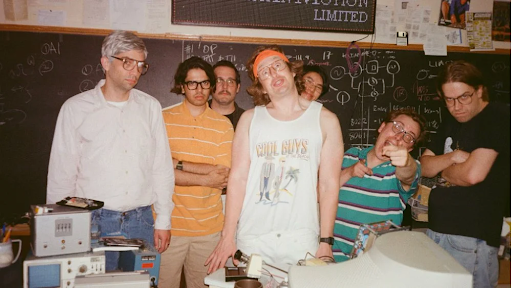Capitalism requires a suspension of disbelief. If you think about the mechanisms of the web of bullshit we’ve trapped ourselves in for too long, the whole thing crumbles under its own weight. And so, creating and fostering that myth becomes, more than anything, the goal of those sitting atop the food chain. This is especially true within the world of Big Tech, an industry obsessed with labeling themselves as harbingers of some great utopian future where technology advances the human cause to unknown heights of comfort and happiness. Nowadays, these great soothsayers sound more like snake oil salesmen trying to convince us that brain-altering pits of venom are, actually, useful tools of mass communication. We, for the most part, know better. Which is why BLACKBERRY, the new film from Canadian director Matt Johnson, becomes both a fascinating and frustrating look at how that myth begins to falter under the weight of material failure.
Where past films of this ilk—the best being the dual Sorkin masterpieces THE SOCIAL NETWORK and STEVE JOBS—have wrestled with the success of these Great Men and their nasty antisocial behavior, BLACKBERRY, which tells the story of the world’s most retroactively forgettable cell phone, never really pretends any of these people are all that smart. The primary forces behind BlackBerry here are Mike Lazaridis (Jay Barachul) and Jim Balsillie (Glenn Howerton), the former the brains behind the operation while the latter the salesman. We see their famous clickety-clack phone rise from inception to the point in which BlackBerry made up 45% of the cell phone market, a kind of cradle to grave product arc. The film jumps around liberally though, somewhat following in the footsteps of STEVE JOBS, which anchored the movie around three Apple presentations, but not fully committing to the bit. Each timeline presents the challenges—and challenges overcome—you might expect from your more typical “based on true events” type fare, but without the shine of “genius” often given the focus of these stories.

What separates BLACKBERRY, perhaps, is the fact that we know that no one owns a keyboarded cell phone in 2023. These are the losers we are watching, their genius undercut, rather than upheld, by the consumer activity of the last 15 years. That’s not to say either of them fully approach lovable loser territory. Balsillie, played menacingly by Howerton, is as mean of son of a bitch as Eisenberg’s Zuckerberg, while Lazaridis is ready to fuck over his closest friend at the drop of a hat. What we know is that none of that ruthlessness was worth it, that their product failed to sell, and that the myth surrounding them fell like their stock price.
A better movie might have examined this idea more thoroughly, fleshing out the characters beyond the beats the narrative requires. That doesn’t quite happen here. Even as Howerton and Barachel give career best performances, they serve a very specific and narrow purpose in the movie, becoming caricatures of the oily businessman and the constantly flummoxed egghead, instead of two people tantalizingly close to the kind of endless reverence we heap upon the “winners.” All the needle drops and playful framing Johnson uses to paint the edges cannot hide the smudged picture at its center. Like a phone with a built-in keyboard, BLACKBERRY is a movie just short of true innovation and greatness, destined for footnote status.















Comments